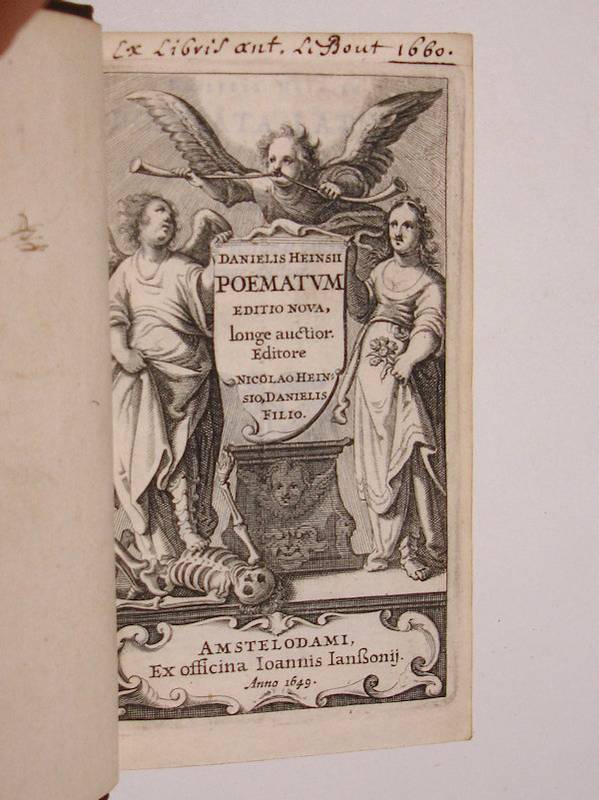HEINSIUS,D.
Danielis Heinsii Poemata Latina et Graeca; Editio post plurimas postrema longe auctior.
Amsterdam (Amstelodami), Apud Joannem Janssonium, 1649.
12mo. (XII),666,(2 errata),(4 blank) p., frontispiece. Calf 13.5 cm 'Elegantly printed edition of Heinsius' collective neo-Latin & neo-Greek poetry' (
Ref: STCN ppn 850068738; Cf. Willems 1613; Berghman 865; Rahir 2013; Ebert 9380; Brunet 3,84; Graesse 3,232; Ebert 9380) (
Details: Back elaborately gilt, with 5 raised bands, and with a red morocco letterpiece in the second compartment. Boards with tripple fillet gilt borders, within which is another tripple fillet rectangle with cornerpieces. Marbled endpapers. Engraved frontispiece, depicting a kind of altar on which rests a shield with text; the altar is flanked by an angel and a girl; the angel tramples on a skeleton; above this scene soars a winged Fama, blowing two horns) (
Condition: Joints slightly rubbed. Two small wormholes in the leather at the foot of the spine, and some damage to the lower edge of lower board for ca. one cm. Small hole in the leather of rear cover. On the blank upper margin of the frontispiece an ownership entry) (
Note: The Dutch classical scholar of Flemish origin Daniel Heinsius, 1580-1655, who enjoyed international fame as an editor of classical texts, theorist of literary criticism, historian and neolatin poet, was professor of Poetics at the University of Leiden since 1603, extraordinarius Greek since 1605. After the death of J.J. Scaliger, to whose inner circle he belonged, he held the chair of Greek, from 1609 till 1647. He is best known for his edition of Aristotle's treatise on poetry (1611), which he studied in connection with the 'Ars Poetica' of Horace. This edition is 'the only considerable contribution to the criticism and eludication of the work that was ever produced in the Netherlands. (...) In his pamphlet 'De tragoediae Constitutione', published in the same year (1611), he deals with all the essential points in Aristotle's treatise, giving proof that he has thoroughly imbibed the author's spirit. (...) It was through this work that he became a centre of Aristotelian influence in Holland. His influence extended, in France, to Chaplain, and Balzac, to Racine and Corneille; in Germany to Opitz; and in England to Ben Jonson'. (J.E. Sandys, 'A history of classical scholarship, N.Y., 1964, vol. 2, p. 314) Heinsius was a representative of the great age of Neo-Latin in the Low Countries, which encompasses the 16th century, and a good part of the 17th century. Here the Anacreontic-Petrarcan love poetry in Latin was kept alive. (J. IJsewijn, 'Companion to Neo-Latin studies', vol. 1, Leuven 1990, p. 154) This volume of Heinsius' poetry, which was, as the text of the frontispiece tell us, edited by his son Nicolaus Heinsius, opens with early work, the three books of Sylvae, followed by Hipponax, an Ode to Molinus, 3 books of Elegiae, and the Monobiblos. Then comes the 'Herodes Infanticida, tragoedia', followed by Heinsius' last long Latin poem 'De contemptu mortis', a didactic poem in 4 books, wherein arguments, Platonic, Stoic and Christian, are set forth which explain why man should not fear death. Then Heinsius' Epigrams and occasional poetry, the 'Elegiarum iuvenilium libri'. At the end we find Heinsius' literary tour de force, his Greek poems, which were inspired by Theocritus and the Anthologia Graeca. It opens with 'Peplus' (Gown), a series of epigrams which Heinsius composed on Greek authors and philosophers. This part is followed by occasional poetry in Greek which Heinsius wrote for his contemporaries, like Casaubon, and by a section with Heinsius' Latin translations of Greek poetry. The collection closes with the 'Liber adoptivus', which contains occasional poetry addressed to Heinsius by J.J. Scaliger, J. Dousa, H. Grotius et alii. This edition of 1649 is a reissue of an edition of the collected greek and latin poetry of Heinsius, which was published by Heger in Leiden in 1640) (
Provenance: 'Ex libris 'Ant. La Bout, 1660', or 'Ant. LaBout') (
Collation: *6, A- D12, 2E-2F6 (leaves 2F5 & 2F6 blank)) (Photographs on request)
Book number: 120256 Euro 290.00
Keywords: (Oude Druk), (Rare Books), Heinsius, Neolatin poetry, Neulatein, Neulateinische Dichtkunst, antike altertum antiquity, neolatin literature
 HEINSIUS,D.
HEINSIUS,D.

